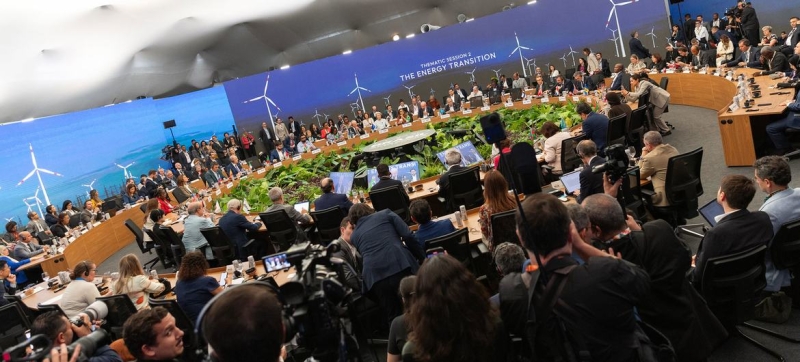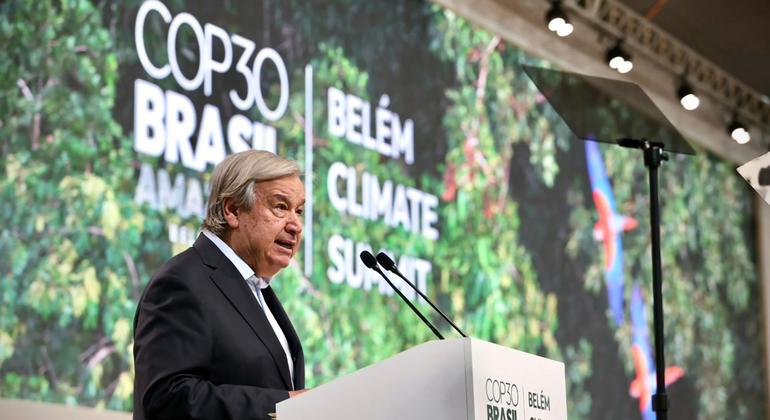
Negotiations on the transition to sustainable energy in Belem, Brazil. UN climate conference in Belém kicks off with call to keep promises and increase funding Climate and Environment
Thousands of diplomats, experts and activists are heading to Belém, in the Brazilian Amazon, for COP30, the next round of UN-led climate talks. Their main goal is to turn promises into action by agreeing on stronger plans to reduce greenhouse gas emissions.
After decades of negotiations and annual, not always successful, summits – from Kyoto to Sharm el-Sheikh – the planet continues to warm. Public pressure on governments and big business to act has recently reached critical levels.
The holding of the thirtieth UN Climate Conference in Belém, on the edge of the Amazon – the world’s largest tropical forest – underscores the scale of the problem: the region is both a vital carbohydrate sink and the front line in the fight against deforestation and change. climate.
This year the forum aims to change course. Delegates will review countries’ climate plans in detail, push for $1.3 trillion in annual climate funding, enact new climate adaptation measures, and advance the concept of a “just transition” to a green economy.Conference organizers are positioning COP 30 as a turning point and a test of global solidarity. The summit opens against the backdrop of alarming forecasts, with scientists warning that the planet is on track to exceed the 1.5 degrees Celsius warming threshold set by the Paris Agreement. resources.
Speaking ahead of the summit, UN Secretary-General Antonio Guterres said bluntly: “The time for negotiations is over. It’s time for action, action and more action.”

The conference will be chaired by Brazil and will be built around an agenda of 30 key goals, each overseen by a team responsible for scaling solutions. The initiative is called Mutiron, a word from an indigenous language in Brazil that means “collective task.” It reflects Brazil’s commitment to highlight the leadership and active participation of indigenous peoples in the conference, as well as in the global fight against climate change.
The Brazilian government says it wants to engage all sectors – from indigenous communities to the business community – in delivering on the countries’ past climate promises.
Mobilizing finance
The agenda at UN climate conferences has traditionally been based on voluntary commitments rather than legally binding norms. The scale of investment required is enormous, requiring at least $1.3 trillion annually by 2035.
Without urgent action, scientists estimate that global temperatures could rise by 2.3 to 2.8 degrees by the end of the century, rendering large regions of the planet uninhabitable due to flooding, extreme heat and destruction ecosystems.
The talks in Belen will focus on the Baku-Belen roadmap prepared by the COP 29 and COP 30 presidents. The document lays out five priorities for resource mobilization, including strengthening six multilateral climate funds, expanding cooperation on taxing polluting activities, and converting public debt into climate investments – a move that could give developing countries access to $100 billion. sue governments over climate policy. Such disputes have already cost states $83 billion in 349 cases.

Why climate conferences matter?
The Conference of the Parties to the United Nations Framework Convention on Climate Change, known as the COP, remains the world’s leading forum for combating the climate crisis. Decisions at such summits are made by consensus, which promotes cooperation in the field of mitigation, adaptation and financing.
Over the years, the most important documents have been adopted at UN climate conferences. In 2015, the Paris Agreement set a goal of keeping global temperature rise “well below 2 degrees” above pre-industrial levels and aiming for 1.5 degrees. At COP28 in Dubai, countries agreed to phase out fossil fuels in a “fair, orderly and equitable manner” and triple renewable energy capacity by 2030. Last year, Baku raised its annual climate finance target for developing countries from $100 billion to $300 billion, with a roadmap to reach $1.3 trillion.
Collectively, the legal architecture built over the past three decades has helped prevent a projected four degrees of warming by the end of century.
KS-30 opens on Monday, November 10th and runs through Friday, November 21st.
